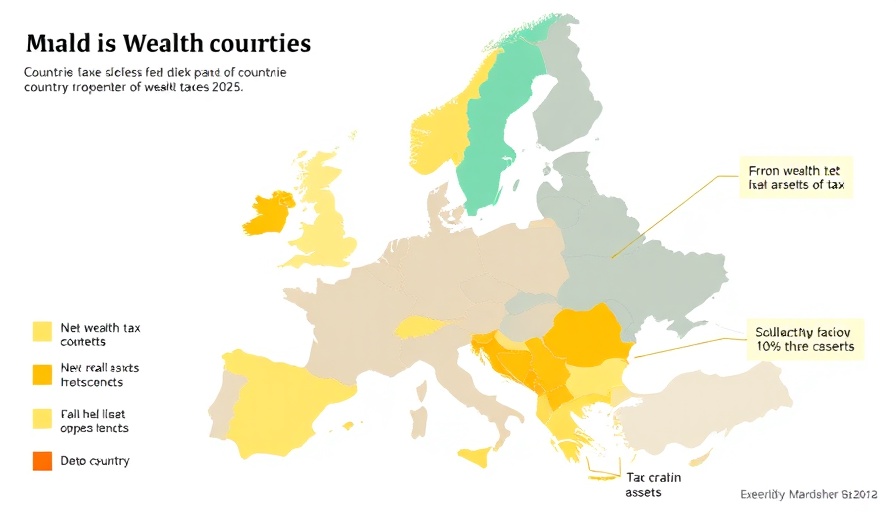
The State of Wealth Taxes in Europe: An Overview
As Europe navigates economic shifts and increased calls for equitable taxation, the discussion around wealth taxes has come to the forefront. A wealth tax is a recurrent tax on an individual’s net wealth, which integrates all owned assets minus liabilities. Despite their theoretical appeal as a means to redistribute wealth, the effectiveness and implications of such taxes are complex and often contentious.
Which Countries Impose Wealth Taxes?
Currently, only three nations in Europe—Norway, Spain, and Switzerland—levy a true net wealth tax. Meanwhile, countries like France, Italy, and Belgium apply taxes on selected assets, albeit not on an individual's comprehensive net wealth. Spain, for instance, imposes a progressive wealth tax that can reach up to 3.5% for individuals with net assets exceeding EUR 3 million.
The Argument Against Wealth Taxes
Critics of wealth taxes cite various reasons for their potential repeal. Among these are the minimal revenue they generate and the legal ambiguities they create. According to a recent OECD report, wealth taxes can deter entrepreneurial ventures and stifle innovation, often resulting in negative long-term economic growth. This detrimental impact on economic performance suggests that efforts would be better directed towards tax reform rather than revenue models that impose additional burdens on asset holders.
Revenue Considerations and Economic Impact
Wealth taxes, as current data indicates, account for a surprisingly low percentage of tax revenues across EU nations. In Spain, for example, the net wealth tax constituted about 0.19% of GDP, while Switzerland, which has a broader tax base and a higher proportion of wealthy individuals, collected around 1.19% of GDP from such taxes. This disparity underscores the challenges policymakers face when designing effective wealth redistribution mechanisms.
Capital Flight: A Growing Concern
One of the most significant risks associated with wealth taxes is capital flight. High-net-worth individuals often seek jurisdictions with lower tax burdens, prompting concerns over economic migration. For instance, recent developments in Spain have seen wealthy citizens exploring relocation to countries like Portugal due to higher taxes imposed by the Spanish government under the new solidarity tax scheme.
Insights from Recent Trends
Despite the theoretical benefits of wealth taxes in achieving a fairer wealth distribution, the reality is starkly different. Wealth taxes often lead to inefficiencies where high taxation disincentivizes investment, innovation, and job creation, three pillars critical to economic vitality among small to medium enterprises. Thus, the experiences of countries like Norway and Spain provide valuable lessons as policymakers consider re-evaluating their tax structures.
Future Trends and Directions
Looking ahead, continued evaluation of wealth taxes will likely persist. As European nations confront mounting pressures for equitable wealth distribution amidst economic uncertainty, understanding both the gains and the shortcomings of wealth taxation will be vital for CPA's and small businesses as they strategize for future compliance and fiscal planning.
Conclusion
For CPA's and small to medium businesses, staying informed about the evolving landscape of wealth taxes in Europe is crucial. As taxes increasingly affect fiscal outcomes, proactive engagement with tax reform discussions will enable better positioning within dynamic financial frameworks. Explore further insights into tax implications and prepare your business for change.
 Add Row
Add Row  Add
Add 


Write A Comment